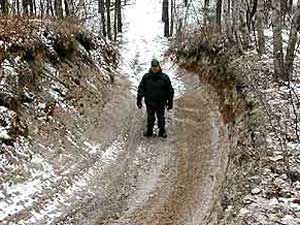Audio
Photos
More from MPR
Resources
Your Voice
| |||||||||||||||||||||||||||||||||||||||||||||||||||||
Dueling off-highway vehicle bills move through Legislature
April 22, 2003
 |
| ATV riders have created this huge rut in Spider Lake Recreation Area, which is part of Foothills State Forest. (MPR file photo) |
Bemidji, Minn. — The number of all-terrain vehicles in Minnesota has nearly tripled over the past decade. That popularity is putting pressure on state lands. The Spider Lake Recreation Area in central Minnesota is a good example. All-terrain vehicles and four-by-four trucks damaged the landscape. They killed vegetation and caused erosion.
After years of little state regulation, there are now dueling off-highway vehicle bills in the Legislature. Off-road groups support a bill in the House that focuses on creating more trails.
People worried about environmental damage favor the Senate version. That bill creates trails, too. But it would also prohibit off-road vehicles on state trails, except for trails specifically designated for motorized use. That's not acceptable to ATV riders. Ray Bohn, lobbyist for The All-Terrain Vehicle Association of Minnesota, says closing the state forests won't work.
 | |||
"You can't get the cart in front of the horse," said Bohn. "You can't close those down until we have the trails, because otherwise, you're banning us. It's nothing more than a defacto ban."
For several years, a slice of the state's gas tax has been used to develop and maintain off-road trails. The Senate bill would tap into those funds to create more trails, and to repair existing damage. They would also create a rider education and certification course. And the Senate bill creates a toll free tip line to turn in violators. Bohn says the Senate bill is too ambitous and too expensive.
"I think it kind of takes a shotgun approach, trying to cure everything all at once," he said. "And the resources just aren't there to do that. I think we have to, number one, getting the trails on the ground."
The Senate bill has broad support from groups concerned about the environment. Matt Norton, lobbyist for the Minnesota Center for Environmental Advocacy, says the gas tax funds should pay for more enforcement officers and rider education. And, he says, it should be used to fix widespread damage.
|
It's nothing more than a defacto ban.
- Ray Bohn, lobbyist, All-Terrain Vehicle Association of Minnesota |
"There's millions of dollars sitting in those accounts, and a great deal of damage has been done by those activities," said Norton. "And yet the people who are the enthusiasts for those activities don't want to take any credit for it. They would like to see those activities continue, and for the rest of the people of the state to foot the bill. And that's not fair."
The Minnesota House has its own bill. It's the one favored by ATV riders. It would keep state lands open to off-road use. Areas would be closed only on a case by case basis. The House bill would designate new trails and provide some money for more enforcement. Matt Norton's environmental advocacy group is fighting the House bill. He says it includes no money for fixing environmental damage.
"The House bill is, I think, nothing more than a bargaining chip, in that it is exactly the opposite of everything that we really need to see to have a workable solution to the OHV problems that we have in Minnesota," said Norton.
Others agree the House bill falls short of what's needed. Barry Babcock is with the Jackpine Coalition. That's a group that formed after off-road vehicles caused damage in the Spider Lake Recreation Area. Babcock says he's optimistic there will be an acceptable compromise between the two bills.
"I think the Legislature realizes that they're going to have to do something with this, because this problem is just becoming more and more magnified every year," Babcock said. "I mean, it's not getting better, it's getting worse."
If the Senate bill passes the Environment Finance Committee today, it could either be passed on to a judicial committee for review, or it could go directly to a vote by the full Senate. The House version could get another committee hearing in the next few weeks.
|
News Headlines
|
Related Subjects
|

